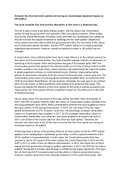Evaluate the view that minor parties are having an increasingly important impact on
UK politics.
You must consider this view and the alternative to this view in a balanced way.
The UK is said to have a two-party political system, with the Labour and Conservative
parties forming the government and opposition after every general election. Other parties,
such as the Liberal Democrats, the Green Party and UKIP, are considered minor parties as
they do not have the support necessary to challenge the two main parties. Despite this,
minor parties have been able to influence governmental policy, the vote share of the Labour
and Conservative parties has fallen, and the FPTP system seems to no longer guarantee
majoritarian governments. However, overall the balance of power in UK politics has not
changed.
In recent years, minor political parties have had a major influence on the policies pursued by
the Labour and Conservative parties. The most impactful example is Brexit. A referendum on
remaining in the European Union had long been the goal of Eurosceptic party UKIP; the
Conservative government agreed to this demand partly out of a fear of losing voters to UKIP.
Another example is the Green Party, whose advocacy has pushed both the major UK parties
to adopt progressive policies on environmental issues. However, major parties taking
policies for themselves ultimately limits the amount of electoral power a minor party has. The
Conservative party’s policy of pursuing Brexit ultimately benefited them, as support for both
UKIP and the Brexit Party/Reform UK has declined. Ultimately, the main goal of any political
party is to win power, so this prevents the minor parties from achieving their goals. This
shows that despite the influence of the minor parties on the kinds of policies pursued by the
major parties, the minor parties still lack a significant impact on UK politics due to their lack
of electoral success.
Also in recent years, the vote share of the major parties has fallen. Most dramatically, in
2010, only 65% of people voted for either the Labour or Conservative parties, resulting in the
first hung parliament since WWII. Many commentators believed this could suggest an end to
two-party politics. At the next general election, in 2015, the vote share of the two major
parties remained low at 67%. However, since then, the percentage of people voting either
Labour or Conservative has increased. In 2017, 82.4% of people voted either Labour or
Conservative. Additionally, even when the vote share dropped to its lowest ever level in
2010, over 2/3rds of the country voted for one of the two main parties. Therefore, the
reduced vote share seen in the 2010s does not prove that the minor parties are having an
increased impact on UK politics.
A third argument in favour of the growing influence of minor parties is that the FPTP system
appears to be creating fewer majoritarian governments. 2 of the 4 general elections in the
2010s resulted in hung parliaments. In both cases, the Conservative government was
required to rely on the support of the minor parties (the Liberal Democrats in 2010 and the
DUP in 2017) in order to form an effective administration. In 2010, this meant the Lib Dems
helped form the government through a coalition agreement; in 2017, the DUP did not enter a
coalition but agreed to provide votes through a confidence and supply agreement. This gave
the Lib Dems and DUP increased power and the ability to influence government policy.
However, coalition government was ultimately disastrous for the Liberal Democrats, with




